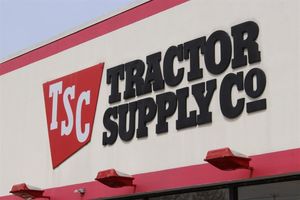Financial News
New Found Makes First New High-Grade Discovery of 2024, Intercepts 26 g/t Au Over 7.65m & 23 g/t Au Over 5.25m at the “Honeypot Zone”
New Found Gold Corp. (“New Found” or the “Company”) (TSX-V: NFG, NYSE-A: NFGC) is pleased to announce the results from 16 diamond drill holes that were completed as part of a drill program designed to test the newly discovered Honeypot Zone located 230m north of Jackpot on the east side of the highly prospective Appleton Fault Zone (“AFZ”). New Found’s 100%-owned Queensway project comprises a 1,662km2 area, accessible via the Trans-Canada Highway, 15km west of Gander, Newfoundland and Labrador.
This press release features multimedia. View the full release here: https://www.businesswire.com/news/home/20240110257559/en/

Figure 1: Photos of mineralization, Left: at ~125m in NFGC-23-1810, Right: at ~126m in NFGC-23-1810 ^Note that these photos are not intended to be representative of gold mineralization in NFGC-23-1810. (Photo: Business Wire)
Honeypot Highlights:
Hole No. |
From (m) |
To (m) |
Interval (m) |
Au (g/t) |
Zone |
NFGC-23-18101 |
122.85 |
130.50 |
7.65 |
26.35 |
Honeypot |
Including |
123.60 |
125.40 |
1.80 |
101.72 |
|
Including |
126.30 |
126.75 |
0.45 |
24.06 |
|
NFGC-23-18281 |
168.00 |
182.70 |
14.70 |
2.05 |
Honeypot |
NFGC-23-19002 |
133.80 |
140.00 |
6.20 |
6.70 |
Honeypot |
Including |
133.80 |
134.30 |
0.50 |
16.93 |
|
Including |
134.90 |
136.00 |
1.10 |
17.24 |
|
And2 |
146.00 |
148.00 |
2.00 |
1.54 |
|
NFGC-23-19312 |
208.00 |
213.25 |
5.25 |
23.05 |
Honeypot |
Including |
208.75 |
209.20 |
0.45 |
71.42 |
|
Including |
210.10 |
211.10 |
1.00 |
67.99 |
|
Including |
211.80 |
212.80 |
1.00 |
11.39 |
|
Table 1: Honeypot Drilling Highlights |
|||||
Note that the host structures are interpreted to be steeply dipping and true widths are generally estimated to be 170% to 95% and 240% to 70% of reported intervals. Infill veining in secondary structures with multiple orientations crosscutting the primary host structures are commonly observed in drill core which could result in additional uncertainty in true width. Composite intervals reported carry a minimum weighted average of 1 g/t Au diluted over a minimum core length of 2m with a maximum of 4m consecutive dilution when above 200m vertical depth and 2m consecutive dilution when below 200m vertical depth. Included high-grade intercepts are reported as any consecutive interval with grades greater than 10 g/t Au. Grades have not been capped in the averaging and intervals are reported as drill thickness. |
|||||
- 26.4 g/t Au over 7.65m in NFGC-23-1810, intersected at a vertical depth of 91m, and 23.1 g/t Au over 5.25m in NFGC-23-1931, located a further 100m down-dip, are part of a new discovery called Honeypot that was found along the east side of the AFZ, 230m north of Jackpot and 1.3km north of Lotto. This discovery was made as a result of a follow-up drill program testing a mineralized fault that was initially identified by grid drilling (Figures 1-4).
- Gold found at Honeypot is hosted within a primary fault that has been drill-defined over a strike length of 280m and to a depth of 190m. The high-grade domain shows good continuity and appears to strengthen at depth.
- Honeypot has a similar east-northeast striking and steeply dipping orientation to the neighbouring Jackpot Zone and ongoing drilling is targeting its expansion along strike and to depth.
Melissa Render, VP of Exploration of New Found, stated: “Our first pass grid drilling reconnaissance program working north of Jackpot intersected a near-surface, brittle fault with characteristics similar to the other epizonal high-grade gold-bearing faults found along this segment of the AFZ. In following this structure to depth, we are finding that Honeypot is delivering encouraging high-grade results over significant widths. There is limited drilling in this area and we are eager to expand upon these high-grade results as we kick off our 2024 drill program.”
Drillhole Details
Hole No. |
From (m) |
To (m) |
Interval (m)* |
Au (g/t) |
Zone |
NFGC-23-16761 |
64.15 |
66.20 |
2.05 |
2.29 |
Honeypot |
NFGC-23-16931 |
67.30 |
69.90 |
2.60 |
1.71 |
Honeypot |
NFGC-23-17811 |
77.80 |
81.30 |
3.50 |
1.26 |
Honeypot |
NFGC-23-17851 |
37.50 |
40.10 |
2.60 |
1.16 |
Honeypot |
NFGC-23-1788 |
No Significant Values |
Honeypot |
|||
NFGC-23-1791 |
No Significant Values |
Honeypot |
|||
NFGC-23-17941 |
58.95 |
63.35 |
4.40 |
3.25 |
Honeypot |
NFGC-23-18101 |
122.85 |
130.50 |
7.65 |
26.35 |
Honeypot |
Including |
123.60 |
125.40 |
1.80 |
101.72 |
|
Including |
126.30 |
126.75 |
0.45 |
24.06 |
|
NFGC-23-1816 |
No Significant Values |
Honeypot |
|||
NFGC-23-18281 |
168.00 |
182.70 |
14.70 |
2.05 |
Honeypot |
NFGC-23-18931 |
131.00 |
133.00 |
2.00 |
1.35 |
Honeypot |
NFGC-23-19002 |
133.80 |
140.00 |
6.20 |
6.70 |
Honeypot |
Including |
133.80 |
134.30 |
0.50 |
16.93 |
|
Including |
134.90 |
136.00 |
1.10 |
17.24 |
|
And2 |
146.00 |
148.00 |
2.00 |
1.54 |
|
NFGC-23-19082 |
184.05 |
186.20 |
2.15 |
1.13 |
Honeypot |
And2 |
191.05 |
200.10 |
9.05 |
1.41 |
|
NFGC-23-19312 |
208.00 |
213.25 |
5.25 |
23.05 |
Honeypot |
Including |
208.75 |
209.20 |
0.45 |
71.42 |
|
Including |
210.10 |
211.10 |
1.00 |
67.99 |
|
Including |
211.80 |
212.80 |
1.00 |
11.39 |
|
NFGC-23-19552 |
198.85 |
203.60 |
4.75 |
1.29 |
Honeypot |
And2 |
209.80 |
213.65 |
3.85 |
3.22 |
|
NFGC-23-1973 |
No Significant Values |
Honeypot |
|||
Table 2: Summary of composite results reported in this press release Honeypot |
|||||
Note that the host structures are interpreted to be steeply dipping and true widths are generally estimated to be 170% to 95% and, 240% to 70%. Infill veining in secondary structures with multiple orientations crosscutting the primary host structures are commonly observed in drill core which could result in additional uncertainty in true width. Composite intervals reported carry a minimum weighted average of 1 g/t Au diluted over a minimum core length of 2m with a maximum of 4m consecutive dilution when above 200m vertical depth and 2m consecutive dilution when below 200m vertical depth. Included high-grade intercepts are reported as any consecutive interval with grades greater than 10 g/t Au. Grades have not been capped in the averaging and intervals are reported as drill thickness. |
|||||
Hole No. |
Azimuth (°) |
Dip (°) |
Length (m) |
UTM E |
UTM N |
Prospect |
NFGC-23-1676 |
299 |
-45.5 |
209 |
659478 |
5430085 |
Honeypot |
NFGC-23-1693 |
299 |
-45.5 |
389 |
659525 |
5430115 |
Honeypot |
NFGC-23-1781 |
320 |
-60 |
101 |
659479 |
5430085 |
Honeypot |
NFGC-23-1785 |
345 |
-45 |
119 |
659473 |
5430110 |
Honeypot |
NFGC-23-1788 |
290 |
-50 |
65 |
659472 |
5430107 |
Honeypot |
NFGC-23-1791 |
335 |
-70 |
74 |
659474 |
5430109 |
Honeypot |
NFGC-23-1794 |
336 |
-52 |
83 |
659435 |
5430058 |
Honeypot |
NFGC-23-1810 |
297 |
-50 |
170 |
659521 |
5430060 |
Honeypot |
NFGC-23-1816 |
283 |
-52 |
194 |
659521 |
5430059 |
Honeypot |
NFGC-23-1828 |
299 |
-45.5 |
230 |
659565 |
5430035 |
Honeypot |
NFGC-23-1893 |
324 |
-64 |
183 |
659522 |
5430059 |
Honeypot |
NFGC-23-1900 |
303 |
-66 |
180 |
659522 |
5430060 |
Honeypot |
NFGC-23-1908 |
300 |
-58 |
219 |
659566 |
5430034 |
Honeypot |
NFGC-23-1931 |
301 |
-63.5 |
240 |
659567 |
5430033 |
Honeypot |
NFGC-23-1955 |
311 |
-68 |
267 |
659567 |
5430034 |
Honeypot |
NFGC-23-1973 |
315 |
-58 |
264 |
659543 |
5429989 |
Honeypot |
Table 3: Details of drill holes reported in this press release |
||||||
Queensway 650,000m Drill Program Update
The Company is currently undertaking a 650,000m drill program at Queensway and approximately 10,000m of core is currently pending assay results.
Sampling, Sub-sampling, and Laboratory
All drilling recovers HQ core. Drill core is split in half using a diamond saw or a hydraulic splitter for rare intersections with incompetent core.
A geologist examines the drill core and marks out the intervals to be sampled and the cutting line. Sample lengths are mostly 1.0 metre and adjusted to respect lithological and/or mineralogical contacts and isolate narrow (<1.0m) veins or other structures that may yield higher grades.
Technicians saw the core along the defined cutting line. One-half of the core is kept as a witness sample and the other half is submitted for analysis. Individual sample bags are sealed and placed into totes, which are then sealed and marked with the contents.
New Found has submitted samples for gold determination by fire assay to ALS Canada Ltd. (“ALS”) and by photon assay to MSALABS (“MSA”) since June 2022. ALS and MSA operate under a commercial contract with New Found.
Drill core samples are shipped to ALS for sample preparation in Sudbury, Ontario, Thunder Bay, Ontario, or Moncton, New Brunswick. ALS is an ISO-17025 accredited laboratory for the fire assay method.
Drill core samples are also submitted to MSA in Val-d’Or, Quebec. MSA operates numerous laboratories worldwide and maintains ISO-17025 accreditation for many metal determination methods. MSA is an ISO-17025 accredited laboratory for the photon assay method.
At ALS, the entire sample is crushed to approximately 70% passing 2mm. A 3,000-g split is pulverized. “Routine” samples do not have visible gold (VG) identified and are not within a mineralized zone. Routine samples are assayed for gold by 30-g fire assay with an inductively-couple plasma spectrometry (ICP) finish. If the initial 30-g fire assay gold result is over 1 g/t, the remainder of the 3,000-g split is screened at 106 microns for screened metallics assay. For the screened metallics assay, the entire coarse fraction (sized greater than 106 microns) is fire assayed and two splits of the fine fraction (sized less than 106 microns) are fire assayed. The three assays are combined on a weight-averaged basis. Samples that have VG identified or fall within a mineralized interval are automatically submitted for screened metallic assay for gold.
At MSA, the entire sample is crushed to approximately 70% passing 2mm. For “routine” samples that do not have VG identified and are not within a mineralized zone, the samples are riffle split to fill two 450g jars for photon assay. The assays reported from both jars are combined on a weight-averaged basis. If one of the jars assays greater than 1 g/t, the remaining crushed material is weighed into multiple jars and are submitted for photon assay.
For samples that have VG identified or are within a mineralized zone, the entire crushed sample is weighed into multiple jars and are submitted for photon assay. The assays from all jars are combined on a weight-averaged basis.
All samples prepared at ALS or MSA are also analyzed for a multi-element ICP package (ALS method code ME-ICP61) at ALS Vancouver.
Drill program design, Quality Assurance/Quality Control and interpretation of results are performed by qualified persons employing a rigorous Quality Assurance/Quality Control program consistent with industry best practices. Standards and blanks account for a minimum of 10% of the samples in addition to the laboratory’s internal quality assurance programs.
Quality Control data are evaluated on receipt from the laboratories for failures. Appropriate action is taken if assay results for standards and blanks fall outside allowed tolerances. All results stated have passed New Found’s quality control protocols.
New Found’s quality control program also includes submission of the second half of the core for approximately 2% of the drilled intervals. In addition, approximately 1% of sample pulps for mineralized samples are submitted for re-analysis to a second ISO-accredited laboratory for check assays.
The Company does not recognize any factors of drilling, sampling or recovery that could materially affect the accuracy or reliability of the assay data disclosed.
The assay data disclosed in this press release have been verified by the Company’s Qualified Person against the original assay certificates.
The Company notes that it has not completed any economic evaluations of its Queensway Project and that the Queensway Project does not have any resources or reserves.
Qualified Person
The scientific and technical information disclosed in this press release was reviewed and approved by Greg Matheson, P. Geo., Chief Operating Officer, and a Qualified Person as defined under National Instrument 43-101. Mr. Matheson consents to the publication of this press release dated January 10, 2024, by New Found. Mr. Matheson certifies that this press release fairly and accurately represents the scientific and technical information that forms the basis for this press release.
About New Found Gold Corp.
New Found holds a 100% interest in the Queensway Project, located 15km west of Gander, Newfoundland and Labrador, and just 18km from Gander International Airport. The project is intersected by the Trans-Canada Highway and has logging roads crosscutting the project, high voltage electric power lines running through the project area, and easy access to a highly skilled workforce. The Company is currently undertaking a 650,000m drill program at Queensway and is well funded for this program with cash and marketable securities of approximately $57.3 million as of January 2024.
Please see the Company’s website at www.newfoundgold.ca and the Company’s SEDAR+ profile at www.sedarplus.ca.
Acknowledgements
New Found acknowledges the financial support of the Junior Exploration Assistance Program, Department of Natural Resources, Government of Newfoundland and Labrador.
Contact
To contact the Company, please visit the Company’s website, www.newfoundgold.ca and make your request through our investor inquiry form. Our management has a pledge to be in touch with any investor inquiries within 24 hours.
Neither the TSX Venture Exchange nor its Regulation Services Provider (as that term is defined in the policies of the TSX Venture Exchange) accepts responsibility for the adequacy or accuracy of this release.
Forward-Looking Statement Cautions
This press release contains certain "forward-looking statements" within the meaning of Canadian securities legislation, relating to exploration, drilling and mineralization on the Company’s Queensway gold project in Newfoundland and Labrador; assay results; the interpretation of drilling and assay results, the results of the drilling program, mineralization and the discovery of zones of high-grade gold mineralization; plans for future exploration and drilling and the timing of same; the merits of the Queensway project; future press releases by the Company; and funding of the drilling program. Although the Company believes that such statements are reasonable, it can give no assurance that such expectations will prove to be correct. Forward-looking statements are statements that are not historical facts; they are generally, but not always, identified by the words “expects”, “plans”, “anticipates”, “believes”, “interpreted”, “intends”, “estimates”, “projects”, “aims”, “suggests”, “indicate”, “often”, “target”, “future”, “likely”, “pending”, “potential”, “goal”, “objective”, “prospective”, “possibly”, “preliminary”, and similar expressions, or that events or conditions “will”, “would”, “may”, “can”, “could” or “should” occur, or are those statements, which, by their nature, refer to future events. The Company cautions that forward-looking statements are based on the beliefs, estimates and opinions of the Company's management on the date the statements are made, and they involve a number of risks and uncertainties. Consequently, there can be no assurances that such statements will prove to be accurate and actual results and future events could differ materially from those anticipated in such statements. Except to the extent required by applicable securities laws and the policies of the TSX Venture Exchange, the Company undertakes no obligation to update these forward-looking statements if management's beliefs, estimates or opinions, or other factors, should change. Factors that could cause future results to differ materially from those anticipated in these forward-looking statements include risks associated with possible accidents and other risks associated with mineral exploration operations, the risk that the Company will encounter unanticipated geological factors, risks associated with the interpretation of assay results and the drilling program, the possibility that the Company may not be able to secure permitting and other governmental clearances necessary to carry out the Company's exploration plans, the risk that the Company will not be able to raise sufficient funds to carry out its business plans, and the risk of political uncertainties and regulatory or legal changes that might interfere with the Company's business and prospects. The reader is urged to refer to the Company's Annual Information Form and Management’s discussion and Analysis, publicly available through the Canadian Securities Administrators' System for Electronic Document Analysis and Retrieval (SEDAR+) at www.sedarplus.ca for a more complete discussion of such risk factors and their potential effects.
View source version on businesswire.com: https://www.businesswire.com/news/home/20240110257559/en/
Contacts
New Found Gold Corp.
Per: “Collin Kettell”
Collin Kettell, Chief Executive Officer
ckettell@newfoundgold.ca
+1 (845) 535-1486
More News
View More




Recent Quotes
View More
Quotes delayed at least 20 minutes.
By accessing this page, you agree to the Privacy Policy and Terms Of Service.



